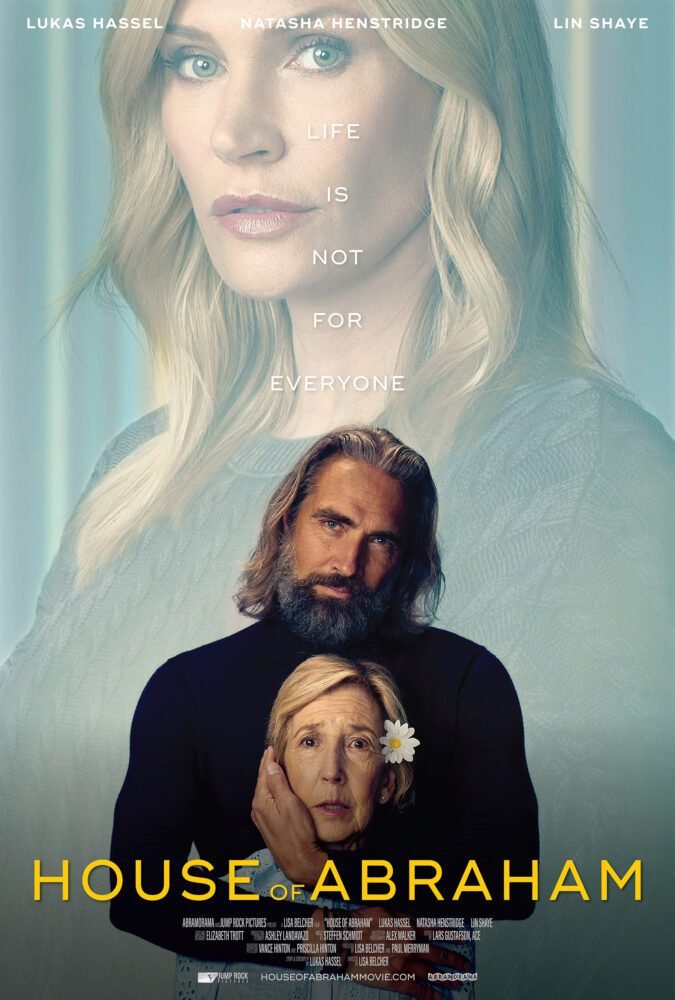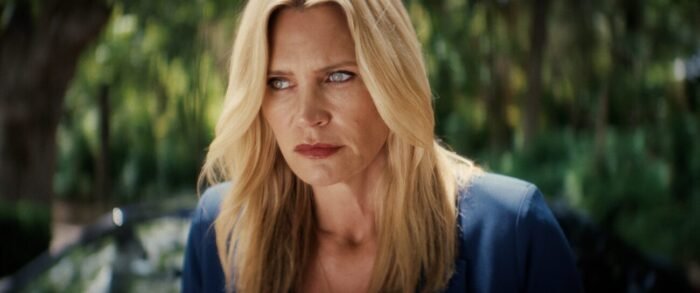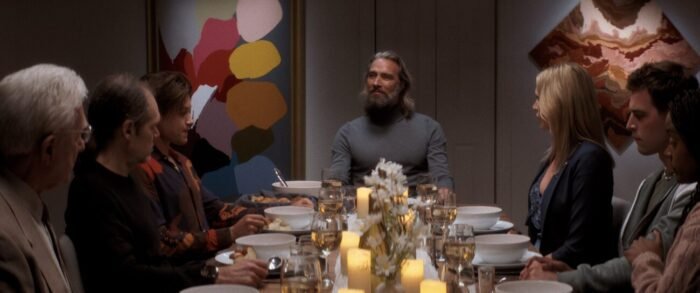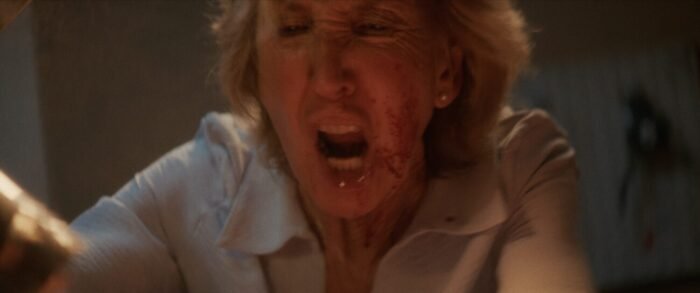*The following film review may be triggering to some as House of Abraham heavily concerns assisted suicide. If you or anyone you know is suffering, help is available by contacting the Suicide and Crisis Lifeline. Call or send a text to 988 on your phone.*
It’s hard to believe it’s been four years since Slapface, the film that had horror fans embracing Lukas Hassel for his dark and terrifying role as the film’s monster. Well, Hassel is back with a new movie, and this time he’s filling the shoes of a different monster. I felt a strong magnetism to House of Abraham when I read the synopsis, in which a woman plans a retreat to an assisted suicide facility, only to become disenchanted when the concept of a dignified death becomes co-opted by the cultish persona of the facility’s enigmatic leader. The story is a fascinating exploration of heavy burdens, false promises, and observable manipulation, and a very original screenplay from Hassel himself. It also doesn’t hurt to see Hassel back with his The Black Room cast, Natasha Henstridge, and Lin Shaye round out the lineup.

House of Abraham begins rather darkly, with a small child finding her mother losing the battle and succumbing to the dark thoughts plaguing her when she returns home from school. If you didn’t have an idea of what House of Abraham is about ahead of time, it’s hard to prepare for an opening scene of such dread-ridden depth and cruelly realized images; the emotional toll is resonant and commanding. The House of Abraham really locks you in with that pivotal first scene.
Director Lisa Belcher quickly shifts away, resetting with Dee (Henstridge) arriving at a remote residence. Beatrice (Shaye) greets Dee earnestly but strangely, telling her to leave the keys in the car and come on in. With the look and feel of an all-inclusive resort, Dee is provided a room and reads the rules of the establishment as other guests begin to arrive. Dee and the group are introduced to each other and to Abraham (Hassell), who also lays out a list of activities for the guests’ final days and asks them to reveal the exact way they would like to go. They’re told to ring an iron bell when they’re ready, but they can change their mind at any time. But when a guest suddenly has a change of heart, the veneer slips, and Dee feels assured that The House of Abraham isn’t exactly a peaceful place for transcendental ascension.

While it remains a controversial topic, assisted suicide has potential for people suffering from exceptionally violent illnesses. It is currently allowed in eleven states and Washington, D.C. If you’d do it for a suffering pet, why wouldn’t you want to allow a person the dignity of a more peaceful death? That being said, the film imagines that these suicide retreats may exist in less-than-legal spaces, and that anyone looking to die can be vetted and invited to a place like the House of Abraham.
For a movie that lays it all out on the table, House of Abraham hides something more beneath the surface. Its subject matter may be deeply troubling, yet it manages to say a whole lot about the state of our society in the time allotted without ever getting preachy or judgmental about assisted suicide in practice. As guests begin to test the boundaries of their autonomy, whether it be Pierre’s (Sean Freeland) snide comments or Dee’s consistent goading, it leads to Abraham becoming manipulative or, in some cases, sociopathic. He feeds the distress and darkness of the house’s temporary residents. All of that, combined with Dee’s assumption that the House of Abraham isn’t what it seems, exposes a truth about the exploitation of ideas and people without any oversight.
Oddly enough, it feels like an outright attack on the legal mumbo jumbo of big tech companies. Here you have Hassel, as the turtleneck-wearing guru of this organization, walking around with some of the residents looking at him as if he were a messiah—the apostolic inference relating to Steve Jobs and the announcement of new Apple products. However, there’s a lot that those companies aren’t telling you outright, embedded deep within the clauses of those Terms and Conditions contracts. Not only are they collecting and profiting from your data, but last year, Kanokporn Tangsuan experienced a fatal allergic reaction while visiting Disney World. When the family filed suit against the restaurant and Disney, the company turned around and claimed the family could not sue the theme park because they had agreed not to when they signed up for streaming service Disney+.

Essentially, House of Abraham does a lot of the same. Associating a person with their walk-in value, then discarding them when they’re no longer of use to the place. Having signed away their rights at the door, when Dee sees Beatrice going through the guests’ bags early in the film, shows how little autonomy they actually have. If assisted suicide practices were to go more mainstream, House of Abraham might be what a capitalist business venture would look like when blind trust is poured into the situation.
Though Hassel’s script is densely packed with metaphor, it’s also unfortunately mostly predictable. The film’s final twist, when it puts all the pieces into place, ties things up nicely. Still, the audience is almost certainly ahead of House of Abraham at almost every turn, so the film relies on audience fascination in Hassel’s performance and the film’s final revelation to do a lot of the heavy lifting. Henstridge is fantastic in her investigatory role, while her surrounding cast members, William Magnuson, Khali Sykes, Gary Clarke, Marval A. Rex, and the aforementioned Freeland, make up an outstanding ensemble. However, it’s Hassel’s demeanor of forced tranquility that ties the whole thing together. Spouting faux-losophy such as “Life isn’t for everyone” makes Abraham seem mentally elevated, less judgmental, and trustworthy, but could he be just another snake-oil salesman in fancier clothing?

The film descends into a cat-and-mouse game for Dee and Abraham, going back and forth at each other as a conversation about fear and acceptance develops between Dee and Alex (Rex). While Dee maintains that something far more nefarious is occurring, Alex wonders if Dee can’t see the peace Abraham is bringing to people who want to die.
House of Abraham may be far from perfect, but I do admire the conversation. People genuinely treat the subject of depression and death as taboo, and House of Abraham lays it all out on the table, challenging and provoking the audience with a scenario they may never have considered. The film is at times unnerving, but ultimately, the audience knows where the movie is going. As I previously stated, I do believe there are instances where assisted suicide could help ease someone’s pain. However, it should be on their terms and the terms of a professional doctor. Where House of Abraham considers it more from the perspective of a franchise in the making, it offers a disquieting calm about some of the rights we are giving away to services we already use. That’s worth thinking about.
House of Abraham is now playing in theaters.

